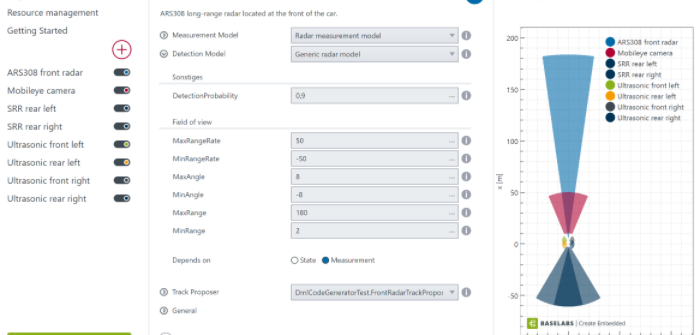German firm Baselabs has launched Baselabs Create Embedded, a new tool for the development of embedded data fusion systems for automated driving functions.
Typical use cases for the new tool, successor to Baselabs Create, include automated emergency braking (AEB), adaptive cruise control (ACC), forward collision warning (FCW) and object fusion for piloted driving. It can also be used for object fusion for diverse paths in decomposed safety architectures, and supports all relevant automotive sensors, such as radar, camera and lidar.
The tool provides a consistent workflow from a first prototype up to series production, which its makers believe is unique in the industry. In the workflow, data fusion systems are configured with a graphical user interface in a very short time. The result is C source code that is suitable for series production.
Baselabs Create Embedded includes data fusion algorithms that combine data from automotive sensors. The object fusion, implemented with the tool, provides a unified object list of the vehicle’s environment. Furthermore, the new tool makes the development of data fusion systems faster and more efficient. The resulting C-code is human readable and comparable to hand-written code. It is customizable and extensible, enabling the developer to handle the individual data fusion challenges with greater flexibility. The data fusion system can easily be adapted to different sensor setups and types.
The C-code is MISRA-C 2012 compliant, dependency-free and runs on typical embedded hardware platforms in the target vehicle, for instance, Infineon Aurix 2G and Renesas RH850.
The data fusion can be integrated into many platforms and runtime environments, including AUTOSAR Classic/Adaptive, bare metal environments, ROS, ADTF, RTMaps, Matlab/Simulink, vADASdeveloper and any custom middleware.
“Many of our clients start their development with simple two-sensor systems. For more demanding use cases, such as the highway pilot, the number of necessary sensors is growing rapidly. Baselabs Create Embedded supports the developer in coping with such challenges, such as the combination of sensors with different viewing angles and overlapping fields of view,” said Norman Mattern, director product development at Baselabs.


